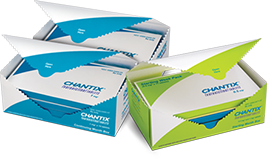 Pfizer ($PFE) has been lobbying the FDA to back off of the black-box warning on its stop-smoking drug Chantix. But patient groups and others have been pushing back--including a panel of FDA advisers, which voted last year to keep the agency's boldest warning on Chantix's official label.
Pfizer ($PFE) has been lobbying the FDA to back off of the black-box warning on its stop-smoking drug Chantix. But patient groups and others have been pushing back--including a panel of FDA advisers, which voted last year to keep the agency's boldest warning on Chantix's official label.
Now, the agency has itself spoken. And it's choosing not only to keep the black box, which highlights warnings about suicide and suicidal thoughts, but also to add new cautionary advice about Chantix's interactions with alcohol. Some Chantix patients have reported unusual or aggressive behavior while drinking, the agency says. A few have experienced seizures.
It's the latest chapter in a long debate over Chantix and its safety, which began soon after its 2006 approval. Patients and their doctors started reporting suicidal thinking, aggression, depression and agitation, and after reviewing the current evidence, the FDA slapped the drug with its black box in 2009. That boxed warning was updated in 2011.
Meanwhile, Pfizer has been rolling out a steady stream of data on the stop-smoking drug, whose sales hit $647 million worldwide last year, $377 million of that in the U.S. The drugmaker has been forwarding data to the FDA as well, in hopes of proving that Chantix isn't to blame for psychiatric troubles its users might suffer when they're trying to quit smoking.
Among those studies was one that focused on smokers who had experienced depression, to counter critics who'd pointed out that earlier trials excluded participants with a history of psychiatric difficulties. That study found no difference in psychiatric side effects in the Chantix arm versus the control arm.
The drugmaker has also backed research that could open up Chantix to larger groups of patients. Last month, a study published in the Journal of the American Medical Association found that smokers who wanted to quit--but had no current plans to actually try--were more likely to actually stop smoking if they were given Chantix versus a placebo. The study authors estimated that up to 14 million current smokers could fit the same profile as that of the study participants.
But even if Pfizer is able to persuade the FDA to add that sort of data to Chantix's label, the company will have to contend with that black-box warning. The boxed warning currently points out risks of agitation, depressed mood, suicidal thinking and other behavioral changes. Chantix's label will now also include new information in the Warnings and Precautions section. Patients should cut down on alcohol when they start taking the drug, to see how they might react to the combination, the FDA says, because patients have reported decreased tolerance to alcohol. Plus, an analysis of the agency's adverse events database and medical literature uncovered rare instances of seizures among Chantix patients who had no history of seizures, or who had seizure disorders that had been well-controlled.
On the positive side for Pfizer, the FDA did add information about several studies that looked at the risk of neuropsychiatric effects with Chantix, including observational studies and Pfizer's analyses of clinical trial data. The studies didn't show an increased risk of neuropsychiatric side effects, the agency points out. "[H]owever, they did not examine all types of neuropsychiatric side effects, and they had limitations that prevented us from drawing reliable conclusions," the agency says.
Late this year, a postmarketing safety study will deliver some more data on Chantix. The agency says it will issue an update--"as appropriate"--when the new information is available.
- see the FDA announcement
Special Report: Top 10 pharma companies by employees - 2014 - Pfizer | Top 10 pharma companies by 2013 revenue - Pfizer